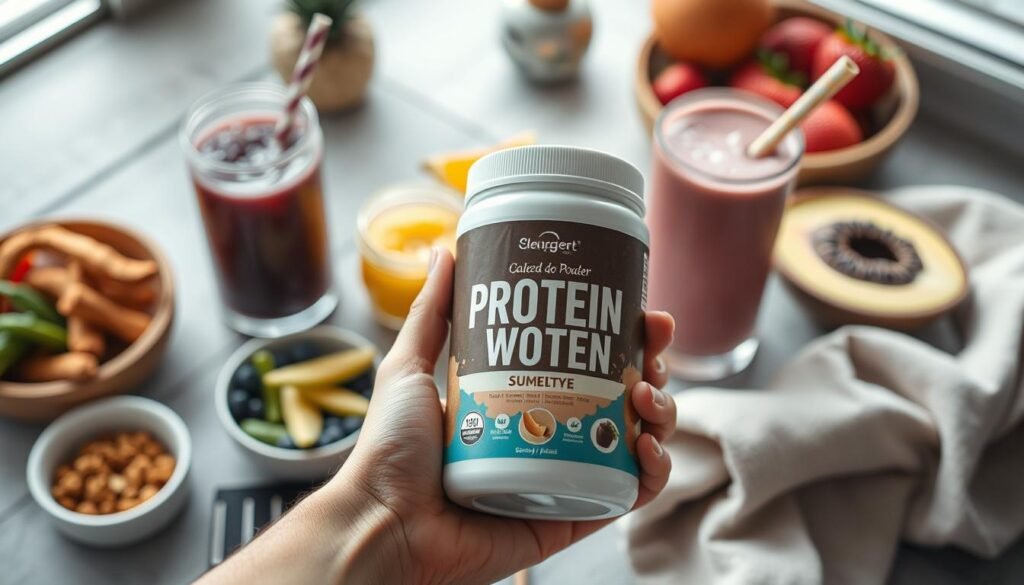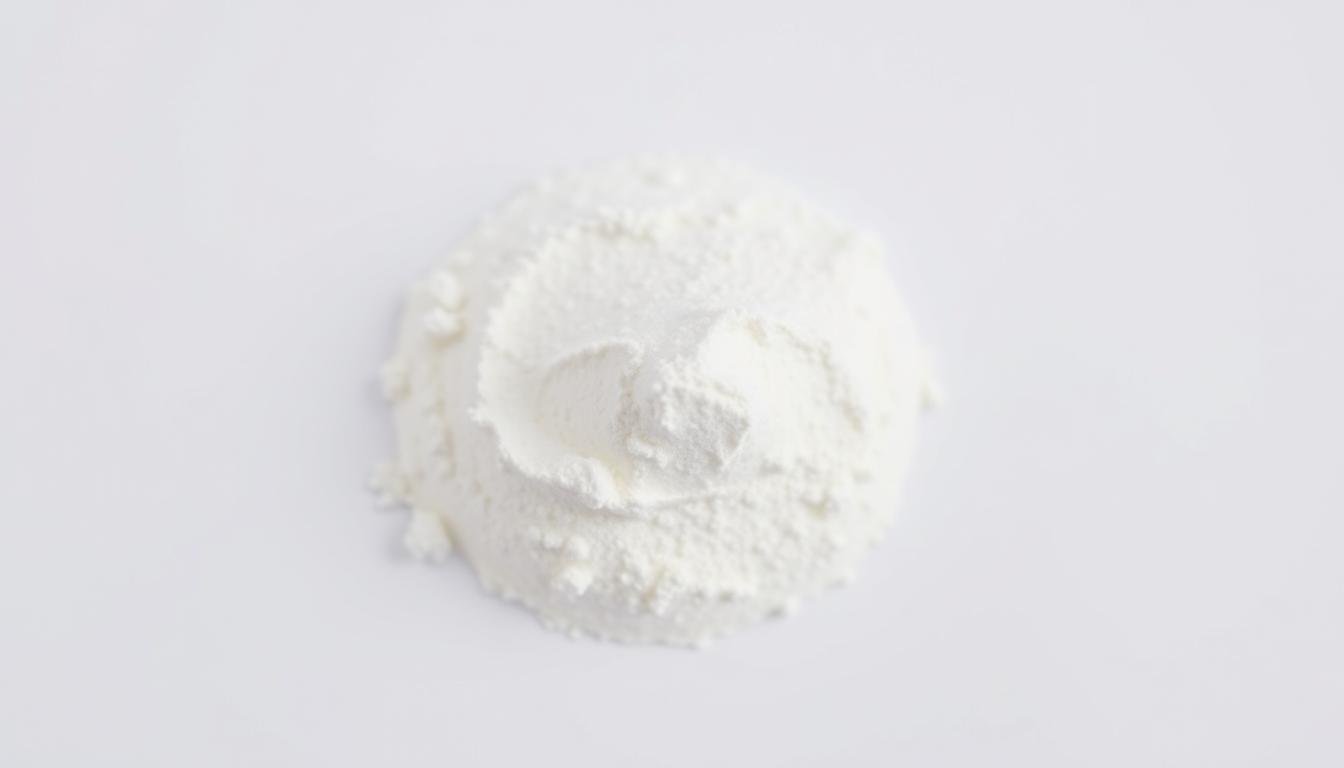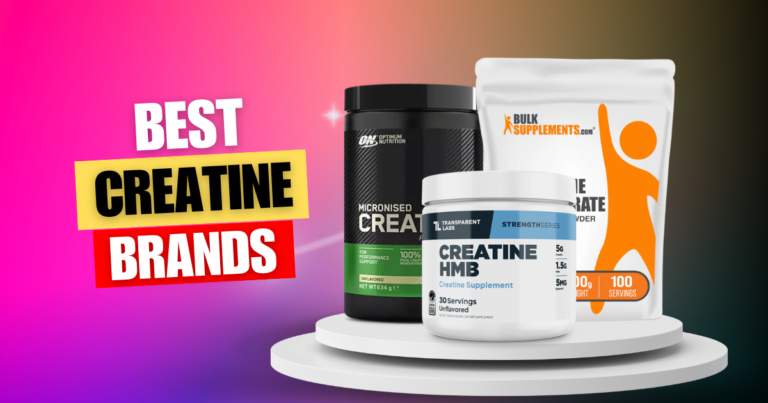Simple Protein Powder: Benefits, Uses & Best Picks
Table of Contents
Remember when protein supplements were just for bodybuilders? Those days are long gone. Today, simple protein powder has become a versatile nutrition powerhouse for everyone.
Whether you’re a busy professional, weekend warrior, or someone looking to boost your nutritional intake, protein supplements are key. The market now offers clean, thoughtfully sourced options that go beyond traditional muscle-building goals.
This guide will walk you through the world of simple protein powders. We’ll help you understand their benefits, choose the right product, and integrate them into your lifestyle. From muscle recovery to convenient nutrition, we’ll explore how these supplements can support your health journey.
Key Takeaways
- Protein powders are no longer just for athletes
- Modern supplements offer clean, whole-food based ingredients
- Protein supplements support multiple health and fitness goals
- Choosing the right protein powder depends on individual needs
- Nutrition science continues to evolve protein supplement quality
Understanding the Basics of Protein Powder
Protein powders are popular for boosting nutrition. They’re great for athletes, fitness fans, or anyone wanting easy nutrition. Knowing about protein powders helps you pick the right supplements.
Simple protein powders have few ingredients and are clean. They offer a simple way to get protein, without extra stuff.
What Makes a Protein Powder Simple
A simple protein powder has:
- Minimal processing
- Few ingredients
- No artificial sweeteners
- High-quality protein sources
Key Components and Ingredients
When looking at whey or plant-based proteins, check for these:
- Protein concentration: Look for 20-25 grams per serving
- Amino acid profile: Complete proteins with all essential amino acids
- Low sugar content
- Minimal additives
Different Types of Protein Sources
Dietary supplements offer many protein sources:
- Whey protein: Fast-absorbing, complete protein
- Casein protein: Slow-release protein
- Plant-based protein: Includes pea, hemp, and rice protein
- Collagen protein: Supports joint and skin health
Knowing about these protein sources helps you pick the best supplement. Each type has its own benefits. Think about your fitness and nutrition goals when choosing a protein powder.
The Science Behind Protein Supplementation
Protein supplements are key for muscle recovery and building lean muscle. The body uses protein to fix and grow muscles. Studies show how protein powders help reach fitness goals.
Protein is vital for muscle repair after hard workouts. It breaks down into amino acids, which help fix and grow muscles. A post-workout shake is great for delivering these nutrients when muscles need them most.
- Essential amino acids trigger muscle protein synthesis
- Protein intake supports muscle repair and growth
- Timing of protein consumption matters for optimal results
Athletes and fitness fans need more protein than regular people. Studies say strength-trained athletes need 1.6 to 1.7 grams of protein per kilogram of body weight each day. This helps with intense training and muscle growth.
| Protein Type | Protein Concentration | Muscle Recovery Potential |
|---|---|---|
| Whey Protein Concentrate | 70-80% | High |
| Whey Protein Isolate | 90% | Very High |
| Plant-Based Protein | 60-70% | Moderate |
*”Protein is not just about quantity, but quality and timing,”* says leading sports nutritionist Dr. Emily Roberts.
When picking a protein supplement, look at more than just protein content. Cold-processed proteins keep more amino acids, which might help muscles recover better. Your fitness goals, diet, and how hard you train will guide the best protein supplement for you.
Benefits of Clean and Simple Protein Powders
Protein powders have changed the game for those who want to live healthy and stay fit. They are easy to use and offer many benefits. These benefits can help you reach your health goals.
Clean protein powders give you the nutrients you need without extra processing or additives. They are a great choice for anyone looking for top-notch nutrition.
Muscle Recovery and Growth
Protein powders are key for muscle recovery after hard workouts. Studies show they help grow muscles and increase strength:
- A 2018 review in the British Journal of Sports Medicine found that weight-training adults taking protein supplements saw substantial muscle size increases in six weeks
- Whey and casein proteins have all nine essential amino acids, helping repair muscles fully
- Protein reduces muscle soreness and speeds up recovery after exercise
Weight Management Support
Adding protein powders to your diet can help with weight management. Research shows their benefits:
- A 2020 review in Clinical Nutrition ESPEN found that adults taking whey protein supplements lost body weight and fat
- Protein makes you feel full, helping control hunger and lower calorie intake
- More protein boosts metabolism and helps keep muscles lean
Convenience and Versatility
Today’s protein powders are super convenient for those with busy lives. You can mix them into smoothies, use them in baking, or make quick shakes after working out.
“Protein powders transform nutrition from complicated to convenient” – Fitness Nutrition Expert
When picking a protein powder, look for ones with clean ingredients, little processing, and third-party testing. This ensures they are of high quality and work well.
Choosing Between Whey and Plant-Based Options
Choosing the right protein powder can be tough. Your diet, health needs, and likes matter a lot. They help decide if whey or plant-based protein is better for you.
Whey protein is a top choice because it has all the amino acids you need. It has 25 to 89 percent protein in concentrate form and up to 98 percent in isolate form. It absorbs quickly and helps muscles recover fast, which is why athletes and gym-goers love it.
- Whey protein advantages:
- Complete protein with all essential amino acids
- Faster absorption rate
- Rich in branched-chain amino acids (BCAAs)
- Supports muscle growth and recovery
- Plant-based protein advantages:
- Suitable for vegans and those with dairy allergies
- Often more environmentally sustainable
- May be easier to digest for some individuals
- Rich in various nutrients depending on protein source
Plant-based supplements are great for those who don’t eat dairy. Pea protein, for example, has about 21 grams of protein per serving and is full of iron. Studies show plant proteins can help build muscle as much as whey when part of a healthy diet.
“The best protein powder is the one that aligns with your nutritional needs and personal health goals.” – Nutrition Expert
Cost and where to find it are also important. Whey protein costs $15 to $60 for 30 servings, while plant-based options are $20 to $50 for the same amount. Your choice should match your diet, taste, and fitness goals.
Simple Protein Powder: Quality Indicators and Standards
Choosing the right protein supplements is key to a healthy lifestyle. Not all protein powders are the same. Knowing how to check their quality helps you make better choices.
Finding the right protein supplements takes focus on important quality markers. These ensure you get a safe and effective product.
Third-Party Testing and Certifications
Good protein supplements get tested by independent groups. Look for these important certifications:
- NSF Certified for Sport
- Informed-Sport Certification
- USDA Organic Verification
- Non-GMO Project Verified
Reading Labels and Ingredient Lists
Understanding protein powder labels can be tough. Key things to look for include:
- Protein source and type
- Protein content per serving
- Additional ingredients
- Potential allergens
“Quality protein supplements are clear about their ingredients and how they’re made.”
Understanding Protein Content Claims
Not all protein claims are the same. Here are some important points to remember:
| Protein Type | Protein Concentration | Processing Method |
|---|---|---|
| Whey Protein Concentrate | 70-80% | Minimal Processing |
| Whey Protein Isolate | 90%+ | Advanced Filtration |
| Plant Protein Blend | 60-70% | Combined Sources |
By knowing these quality markers, you can pick protein supplements that meet your nutritional needs. This helps you stay healthy.
Best Times and Ways to Use Protein Powder

Understanding when and how to use protein powder is key to a good fitness plan. A post-workout shake can greatly help in building lean muscle. It aids in recovery and strength after hard workouts.
Protein intake at the right times can greatly improve your fitness. Here are the best times to use protein powder:
- Post-Workout Recovery: Within 30 minutes after exercise, 20-30g of protein replenishes amino acids and aids muscle repair
- Morning Nutrition: A protein shake in the morning helps break the fast and keeps muscle mass
- Before Bedtime: 40g of casein protein before bed supports muscle recovery after evening workouts
Being creative with protein powder is important. Dietitians suggest different ways to increase protein intake:
- Blend into morning smoothies
- Mix into oatmeal or yogurt
- Use as a baking ingredient in protein-rich treats
- Stir into coffee for an extra protein boost
It’s not just about when you eat protein, but how much you eat daily. Aim for 0.64-1.09g of protein per pound of body weight for muscle building. Adjust based on your fitness goals and workout intensity.
Mixing and Storage Recommendations
Learning how to mix protein powder can boost your health and fitness. The right storage and mixing methods help you enjoy your protein supplements fully. They keep the quality and taste up.
Keeping your protein powder in the right spot is key. It keeps its nutrients fresh and stops it from going bad. The best place is a cool, dry spot with a temperature around 70°F.
Optimal Storage Methods
- Use airtight containers to keep moisture out
- Don’t store it in humid places or near heat
- Keep it in the original container in a pantry or cabinet
- Store it at room temperature (about 70°F)
Blending Techniques for Perfect Protein Shakes
Making smooth protein shakes needs some tricks. Start by adding liquid first. Then slowly add the protein powder while stirring or blending.
| Mixing Method | Recommended Liquid | Mixing Tool |
|---|---|---|
| Basic Shake | Room temperature water/milk | Shaker bottle |
| Smoothie | Almond milk | Blender |
| Baking | Mixed with other ingredients | Whisk |
Creative Recipe Ideas
Turn your protein powder into tasty meals and snacks. Try adding it to pancakes, smoothies, energy balls, and overnight oats. It makes nutrition fun and tasty.
“Protein supplements aren’t just about mixing – they’re about creating a delicious part of your fitness journey.”
Remember, the secret to using protein powder well is to try new things. Find what fits your healthy lifestyle and fitness goals.
Common Mistakes to Avoid with Protein Supplements

Exploring protein supplements can be challenging for those aiming for a healthy lifestyle and good nutrition. Many people make big mistakes that harm their nutritional goals and health.
One big error is relying too much on protein supplements. While they are easy to use, they should not replace whole foods. Your body does best with a mix of natural protein sources like lean meats, legumes, and dairy.
- Misunderstanding protein dosage requirements
- Ignoring ingredient quality
- Consuming excessive protein supplements
- Neglecting whole food nutrition
Watch out for common pitfalls with protein supplements. About 90% of protein powders might have false labels. This is because of nitrogen spiking, a trick to show more protein than is really there.
| Mistake | Potential Consequence |
|---|---|
| Overconsuming protein supplements | Unnecessary calorie intake |
| Ignoring protein source quality | Reduced nutritional effectiveness |
| Not tracking total protein intake | Potential digestive issues |
Experts say to figure out your protein needs by multiplying your weight in pounds by 0.55 to 0.72. For muscle building or if you’re older, you might need a bit more. Most adults need 20 to 30 grams of protein per meal to help muscles and control hunger.
When picking protein supplements, look for quality, clear labels, and match them with your fitness goals. Always read labels, choose trusted brands, and talk to nutrition experts to make the best choices for you.
Conclusion
Choosing the right simple protein powder can change how you view fitness nutrition. It’s about knowing what you need, your goals, and what you like. Whey protein is top because it helps build muscles well with its amino acids.
Choosing the right protein powder can make your healthy lifestyle better. You can pick from plant-based like pea protein or traditional whey. Look for quality, protein amount, and what fits your diet best.
Now you know how to pick the best protein powder. Think about allergies, the planet, and your fitness goals. Protein helps with muscle recovery, weight, and nutrition. This knowledge helps you eat better.
Protein powders are tools, not magic fixes. Use them right in a balanced diet. Listen to your body and choose high-quality, safe supplements that meet your health and fitness goals.





